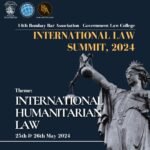Evidence Act Case Laws e-Flashcard Series for Judicial Services Exam
1. Tukaram v. State of Maharashtra
Section 114-A was introduced in the Indian Evidence Act after widespread protest against which judgement.
2. Polanski v. Conde Nast Publication
Video Conferencing was allowed.
3. State of U.P v. Shishpal Singh
The Supreme Court rejected the Dying Declaration which was recorded by the Magistrate but which was not signed by the declarant.
Also Read: Torts Case Laws e-Flashcard Series for Judicial Services/LLM/ Law Exam
4. State through P.S Lodhi Colony v. Sanjeev Nanda
The Supreme Court observed that, “if a witness becomes hostile to subvert the judicial process, the court shall not stand as a mute spectator and every effort should be made to bring home the truth”.
5. Kanpur University v. Samir Gupta & Ors. 1983
Even a “student” may be treated as an expert under section 45 of the Indian Evidence Act, 1872. It was laid down by the Supreme Court.
6. Vadivelu Thevar v. State of Madras AIR 1957 SC 614
The Hon’ble Supreme Court classified the witnesses into three categories (i) wholly reliable, (ii) wholly unreliable, (iii) neither wholly reliable not wholly unreliable.
7. Kanpur University v. Samir Gupta 1983
The Supreme Court of India observed that even a student may be treated as an expert under 45 of the India Evidence Act, 1872.
8. Syed Ibrahim v. State of Andhra Pradesh, AIR 2006 SC, 2908
Supreme Court held that material evidence and not the number of witnesses has to taken note to ascertain the truth of the allegations made.
9. Sahoo v. State of U.P
“A confession even consists of conversation to oneself, for it is not necessary for the relevant of a confession that it should be communicated to some other person”.
10. S. Sudershan Reddy v. State of Andhra Pradesh, AIR 2006 SC 2716
“Relationship is not a factor to affect credibility of a witness’ held by the Supreme Court.



![Call for Campus Ambassadors by Our Legal World [2 Months; Virtual]: Apply by June 15](https://www.ourlegalworld.com/wp-content/uploads/2024/06/Logo-New-136x150.png)


